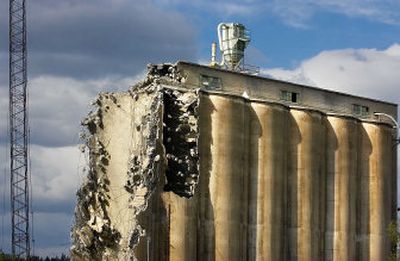Cement plant silos going down

A Spokane Valley landmark, one that churned out the ingredients for Grand Coulee Dam and outlasted legal jousts from a noteworthy Spokane man, is going toe to toe with a wrecking ball this week.
At least in the early rounds, the seven surviving silos of the International Portland Cement Co. seem to be holding up. A Louisiana crew was pounding away at them Monday with a wrecking ball the size of an office desk, but it was taking a good 10 whacks to make visible progress.
Holcim International, the Swiss-based company that owns the 115-foot silos, has no use for them.
“We have not used them for about three years, the reason being that we’re just not in Washington anymore,” said Tom Chizmadia, Holcim’s vice president of communications and public affairs.
Chizmadia said it remains to be seen what will become of the property on the Spokane River opposite Plantes Ferry Park.
There was a time when residents around the cement plant couldn’t wait to see it shuttered. When it was in full production, the plant blanketed its neighbors in inches of cement, some of which still whitens the ground and caps the boulders along the river.
Royal Riblet, whose mansion-turned-Arbor Crest Winery overlooked the cement plant from the bluffs on the north bank of the Spokane River, sued the cement plant in 1951 for property damage stemming from the cement dust. Multiple lawsuits followed, though Riblet was never able to collect more than $32,000 in damages at any given time. A fifth lawsuit was working its way through court when Riblet died in 1960.
Several companies owned the plant before Holcim hung its sign at 12207 E. Empire Ave.
International Portland Cement Co. built the plant in 1910. By the 1920s, the plant employed 250 and had a payroll of $20,000. International Portland Cement Co. gave way to Spokane Portland Cement Co. The latter company cranked out more than 11,000 rail-car loads of cement for Grand Coulee Dam. Many of the ingredients for the cement were gouged from the east shore of Lake Pend Oreille.
Spokane Portland Cement Co. sold to Ideal Cement of Denver in 1954. By 1967, Ideal only used the site as storage for cement churned out in Seattle and later Trident, Mont. Ideal later became part of Holcim International.